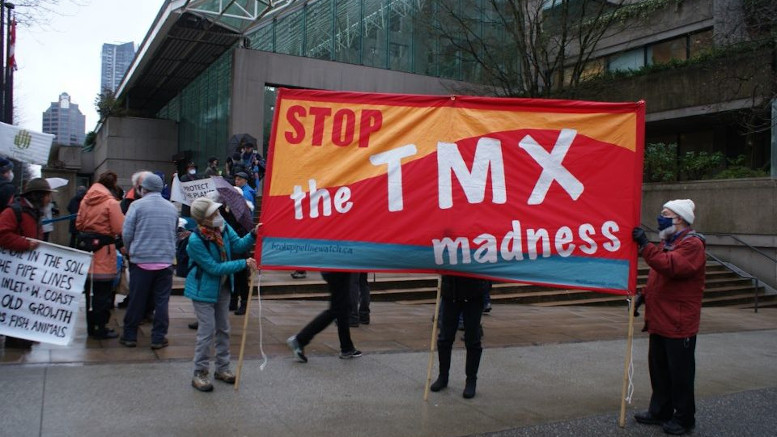The cost of expanding the Trans Mountain Pipeline is out of control. When the government bought the pipeline from Kinder Morgan in 2018 for $4.5 billion, it was estimated that it would cost a further $7.4 billion to complete the expansion. Now the estimate has nearly tripled to $21.4 billion! The increased costs are partly blamed on delays due to the extreme weather conditions last year in British Columbia, ironic for a project that is contributing to climate change and driving more extreme weather conditions.
The federal government has decided it will not put in any more public money. Now Trans Mountain will have to raise money from capitalist investors. This will further raise costs, as they will charge premium interest rates on the very risky investment. If the pipeline is not completed it will generate no revenue, becoming an expensive waste of money.
From the beginning this project was inconsistent with meeting global climate emission targets. The International Energy Agency, a formerly pro-oil lobbying group, says that all new investments in fossil field production must stop now if global temperature rises are to be kept below the 1.5C limit and prevent cascading climate catastrophe. If completed, the Trans Mountain expansion would triple the amount of oil flowing from Alberta to the BC coast.
Does the government’s announcement mean they finally understand the damage this pipeline will cause? Not at all: the government says it is still a “vital project” in the “national interest.” They’ve frozen further public money for the project but are imploring the crown corporation that owns the pipeline to take out loans to make up the increased costs. The government has assured their friends in the big banks, BMO and TD, saying it is still a “commercially viable” investment.
The government is trying to have it both ways. If it’s still a vital project, then why is it not vital enough to spend public money on? Kinder Morgan sold the pipeline in the first place because they were worried about the costs and delays associated with massive public opposition to the project from local Indigenous groups and anyone else who is concerned for the environment. The government has always known this is an unpopular project in Vancouver and in much of the rest of Canada, yet they wanted to build it anyway. They’ve announced they won’t spend more public money on the project because the costs have gotten too embarrassing, but they still want the pipeline built. Caught with their hands in the cookie jar, they’ve taken their hand out but won’t put the jar back in the cupboard.
The federal government’s purchase of this pipeline and determination to expand it have never made economic sense in the context of their climate commitments and targets, as Socialist Alternative argued before. If world governments actually follow through on reducing their use of fossil fuels, this pipeline will become less and less profitable. A study last year from Simon Fraser University estimated the government would likely lose $11.9 billion on the sale of this pipeline, and that was before the cost estimate increased by $8.8 billion!
Pipeline Threatens Environment, Lives, Jobs and Health
This pipeline will carry 890,000 barrels a day of diluted bitumen, which is highly toxic, flammable and far more damaging to health and the environment even than crude oil. The pipeline runs through residential areas and close to schools. The storage terminal on Burnaby mountain poses a fire threat that the Burnaby fire chief, warns would be “unextinguishable due to lack of safe firefighting positions.” Nearly a quarter of a million people live within a 5.2 kilometre radius of dangerous “downwind Sulphur Dioxide exposure area.” Simon Fraser University is close to the terminal, at risk both from fire and fumes, yet the evacuation routes all meet at one intersection, metres from the terminal.
Pipelines and tankers regularly leak and spill oil. A major spill in Vancouver’s harbour would threaten ten thousand jobs and billions in lost income and clean-up costs. All this for 90 new permanent jobs once it is complete.
The pipeline crosses 250 streams and rivers in the Fraser Rivers basin – waterways that are crucial spawning grounds of the endangered Fraser River salmon. The pipeline violates Indigenous people’s land rights and the right to informed and prior consent. Many Indigenous communities, including those around its terminus in Vancouver harbour, clearly oppose its construction.
So why does the government insist that this is a “serious and necessary project,” as Deputy Prime Minister Chrystia Freeland said in her announcement? She said that it would make the Canadian economy “more sovereign and more resilient.” Suncor Energy said, “we remain fully supportive of this world-class infrastructure project which is vital to Canada’s long-term economic success and energy security.” The shareholders’ interests in companies like Suncor Energy are tied to the need to attract investment. If Canada gets a reputation as a place where new resource projects can’t get built, that investment is going to be scared away. That’s why the government is so concerned about getting this project built: they need to show that Canada is “open for business.”
Capitalism Cannot Protect Climate
This is an example of why Socialist Alternative argues that capitalism can’t solve climate change. Capitalist governments never want to do anything that will harm the profitability of oil companies, but the value of oil companies is based on their ability to continue to pump oil out of the ground. So, no matter what the government says about wanting to help reduce global emissions, they’re invested in making sure the oil keeps flowing. Richard Masson, Chairman of the World Petroleum Council Canada, in response to the increased cost of the Trans Mountain expansion said, “Canada’s got a lot of resources, the world needs our resources, but we’re just having so much trouble actually developing them in a cost-effective way.” This from an organization that will host a world congress in Calgary in 2023 with themes of “the energy transition” and “the path to net zero.”
The Canadian public has been going through a repeated cycle where the government says it’s going to spend money to reduce emissions and transition to a low-carbon economy, but then anytime anyone suggests they stop investing in the expansion of fossil fuel production, the government responds by saying “this project is necessary in the short term to meet our energy needs,” and/or “we need the revenues from this project to pay for the transition to a low-carbon economy.” The government keeps saying this over and over again while never taking any credible steps to phase out fossil fuel production. It continues to fund projects that lose the government money.
This “greenwashing” is the new climate denialism. Governments and lobby groups like the World Petroleum Council say that they care about transitioning to clean energy and reducing emissions, but they keep doing exactly the opposite. Governments and corporations keep making promises, setting targets and giving commitments that this time it will be different, but the emissions just keep going up!
Unfortunately, even some labour leaders continue to be convinced by this false rhetoric and short-term thinking. Sean Strickland, the executive director of Canada’s Building Trades Union, called the Trans Mountain expansion a “nation-building” project and said, “the revenue generated from the project will provide our government with the money to re-invest in renewable energy and technology to achieve our climate goals.” The government can always find more money when it really wants to. During the federal emergency response to COVID lockdowns, the government was able to find $110 billion to give directly to businesses with no strings attached — over six times the $17.6 billion the government committed to spend in last year’s budget to meet its climate goals. The idea that royalties from the pipeline expansion and economic activity from 90 permanent jobs are necessary to achieve climate goals just doesn’t make any sense.
Capitalism has always profited from the destruction of the environment as it is a fundamentally non-ecological economic system. Marx pointed this out in the 19th century when he described the “metabolic rift” between the city and the country. He described how capitalism was destroying the soil in order to meet the needs of profit-driven production. Attempts to regulate capitalism have never prevented or changed this basic feature of capitalism. It is a pipe dream — purely utopian wishful thinking — to believe that regulations on capitalism will ever be strong enough to avert the climate disaster. Humanity and nature need a decisive break from this system that is based on production for profit and the robbing of nature, with a transition to a society based on production for human need.
The Trans Mountain Pipeline expansion is a disastrous project that’s only purpose is to encourage further fossil fuel production. The government will lose billions of dollars, it provides hardly any permanent jobs, contributes to global climate emissions, risks serious local environmental damage and is opposed by local Indigenous groups and many other people who live on or near the land the pipeline goes through.
The government has said that no more public money will be spent on the Trans Mountain expansion, and that is a good thing (better late than never), but Socialist Alternative opposes this project outright and supports efforts to protest, delay, and block its construction. We are in solidarity with three activists who were recently sentenced to 14 days in jail for defying a court injunction as well as two others, part of the “Brunette River 6,” while attempting to block construction work, and also with other activists and Indigenous groups who are leading the resistance efforts. The pipeline should be shut down completely and all further investments in and subsidies to fossil fuel production stopped. A massive investment should be urgently made for a Just Transition to guarantee good jobs for all and to protect the environment.
The article was expanded on February 23 to cover in more detail the risks and dangers of the TMX pipeline to environment, lives, jobs and health.




